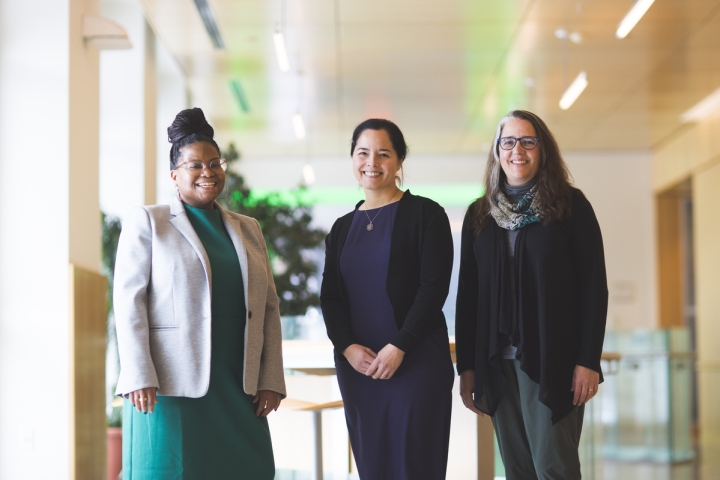Nearly a decade ago, the National Institutes of Health published a data-driven study exposing a troubling, persistent problem in the training of scientists.
"Despite longstanding efforts, diversifying the biomedical research workforce remains an elusive goal, and large sectors of the U.S. population remain underrepresented. These sectors include several racial and ethnic groups; economically disadvantaged individuals; people with disabilities; and women," the authors reported.
Since then, NIH and other government entities have advanced several initiatives designed to bring more diversity into research-based graduate programs.
The Guarini School of Graduate and Advanced Studies has just received one of those grants, through the Initiative for Maximizing Student Development Program.
The five-year, $2 million IMSD award, with additional funding from Dartmouth, will support eight graduate students next year, and then 12 for the subsequent four years.
The participants will have access to mentoring, cohort study groups, and many other hallmarks of Guarini's diversity programming.
"We are delighted to receive this support, which recognizes the excellence of Dartmouth's graduate programs and aligns perfectly with our ongoing efforts to train future scientists from diverse backgrounds," says Guarini Dean F. Jon Kull '88.
The number of underrepresented applicants, including women, first-generation graduate candidates, members of ethnic minorities, and veterans, has been steadily rising at Guarini, Kull says, but despite Dartmouth's high ranking as a research-based institution, it's not always easy to convince post-baccalaureate scientists to enroll in a small, rural graduate school.
"The great thing about IMSD is that it shows prospective STEM students that if they come to Dartmouth, they're going to get really supported, very fully brought on board. And if any students are concerned about preparation in one area or another, we can help them with that," he says.
Kull says IMSD will dovetail with another program designed to diversify Guarini's student body.
"Our Postbac Research Education Program pilot—D-PREP—invites promising students to spend a year with us before graduate school, getting research experience, getting to know Dartmouth, and taking courses, if they choose," he says.
D-PREP students who end up at Dartmouth could join the cohort eligible for IMSD funding.
"We'll help IMSD trainees build the professional development skills and expertise that will allow them to have a broad array of career options available upon their graduation," says Chloe Poston, a bio-analytical chemist and vice president for culture, belonging, and strategic engagement at Dartmouth.
Poston says applying for the grant was a collaborative process involving several faculty and administrators. She'll serve as a diversity, equity, and inclusion adviser, while the other co-principal investigators — Diane Gilbert-Diamond '98, associate professor in epidemiology, medicine, and pediatrics at the Geisel School of Medicine, and Magdalena Bezanilla, the E.E. Just 1907 Professor of Biological Sciences — will help guide the IMSD students as they take full advantage of research opportunities in a welcoming learning environment.
As an Hispanic woman, Bezanilla has experienced various challenges.
"There were microaggressions, macroaggressions—so many barriers. And I had that attitude of, 'I'm going to make this work, no matter what happens.' But that just dilutes the possibilities for so many people who don't have that attitude or don't have that experience from their family. We want to provide an environment where that sort of thing isn't going to turn someone off, and lead them to say 'forget this.'"
Moreover, research shows that opening doors to underrepresented students leads to scientific discoveries that might otherwise have never been made, says Gilbert-Diamond.
"We know that diverse teams tend to bring real strength, and that the questions that are asked can really depend on who's asking them. Varieties of lived experiences really lead to creativity and rigor," she says.
